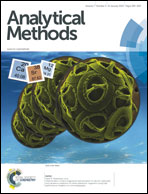Gold cluster based electrocatalytic sensors for the detection of formaldehyde
Abstract
The development of an electrochemical sensor for the analysis of formaldehyde, based on the use of a screen printed carbon electrode modified with gold clusters, is reported in this work. The electrocatalytic properties of the gold clusters enabled the voltammetric detection of formaldehyde, taking place at potentials around +0.3 V (vs. Ag pseudo-reference electrode), at concentration levels down to 1 mM in a 0.1 M NaOH electrolyte solution. A two-step oxidation process was observed, which could be ascribed to the oxidation of this chemical species to produce gem-diol ions and formate. The effect of the gold cluster density on the electrode surface was evaluated. The sensor responded to formaldehyde in a concentration range from 1 mM to 10 mM, the estimated limit of detection being 0.93 mM. The developed sensor was eventually applied to the detection of formaldehyde in tap water. No interference from glucose, formic acid, methanol or ethanol in the analytical sensor signal was observed.


 Please wait while we load your content...
Please wait while we load your content...